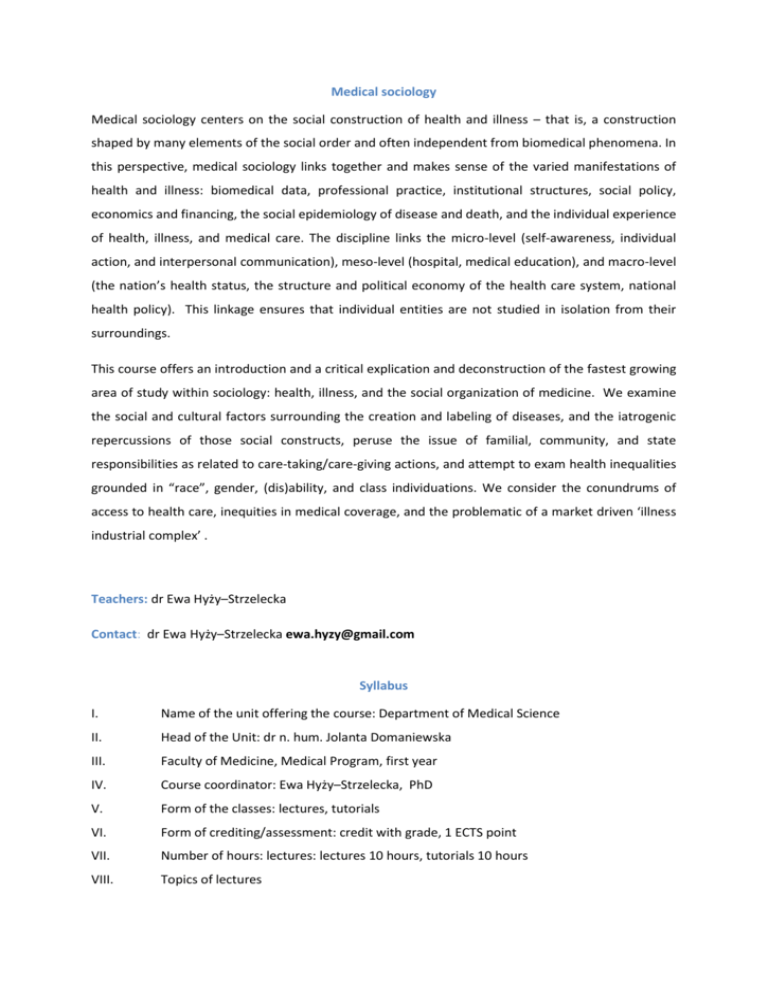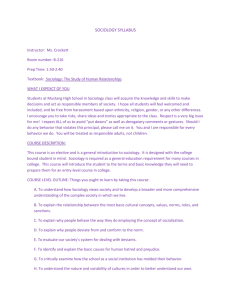
Medical sociology
Medical sociology centers on the social construction of health and illness – that is, a construction
shaped by many elements of the social order and often independent from biomedical phenomena. In
this perspective, medical sociology links together and makes sense of the varied manifestations of
health and illness: biomedical data, professional practice, institutional structures, social policy,
economics and financing, the social epidemiology of disease and death, and the individual experience
of health, illness, and medical care. The discipline links the micro-level (self-awareness, individual
action, and interpersonal communication), meso-level (hospital, medical education), and macro-level
(the nation’s health status, the structure and political economy of the health care system, national
health policy). This linkage ensures that individual entities are not studied in isolation from their
surroundings.
This course offers an introduction and a critical explication and deconstruction of the fastest growing
area of study within sociology: health, illness, and the social organization of medicine. We examine
the social and cultural factors surrounding the creation and labeling of diseases, and the iatrogenic
repercussions of those social constructs, peruse the issue of familial, community, and state
responsibilities as related to care-taking/care-giving actions, and attempt to exam health inequalities
grounded in “race”, gender, (dis)ability, and class individuations. We consider the conundrums of
access to health care, inequities in medical coverage, and the problematic of a market driven ‘illness
industrial complex’ .
Teachers: dr Ewa Hyży–Strzelecka
Contact: dr Ewa Hyży–Strzelecka ewa.hyzy@gmail.com
Syllabus
I.
Name of the unit offering the course: Department of Medical Science
II.
Head of the Unit: dr n. hum. Jolanta Domaniewska
III.
Faculty of Medicine, Medical Program, first year
IV.
Course coordinator: Ewa Hyży–Strzelecka, PhD
V.
Form of the classes: lectures, tutorials
VI.
Form of crediting/assessment: credit with grade, 1 ECTS point
VII.
Number of hours: lectures: lectures 10 hours, tutorials 10 hours
VIII.
Topics of lectures
Lectures:
1. General sociology as a discipline, an introduction, 2 hrs
2. Basic methods of research and their application in the field of medical sociology, 2 hrs
3. Sociology of/in Medicine, 2 hrs
4. Culture – society- health, 2 hrs
5. Social determinants influencing health ,2 hrs
Seminars:
1. The role of being sick, 2hrs
2. Health and illness as social categories, 2 hrs
3. Medicalization and pharmaceuticalization of everyday life, 2 hrs
4. The role of effective communication in the doctor-patient relation, 2 hrs.
5. History of the trends and selected pathologies –alcohol
abuse, domestic violence, obesity,
poverty, unemployment, suicide…Students presentations, 2 hrs
Seminars:
Students (individually or in small groups), using power point, will present the main social problems
and pathologies that occur in their countries (description, statistics, causes, ways of solving those
problems).
Attendance and active participation at lectures and in seminars is required, and it will be recorded.
Evaluation:
The course ends with a grade based on attendance record, performance at the seminars ,
and final test (based on the given in class quizzes)
Textbooks:
W.H. Cockerham, Medical Sociology. 12th ed., Pearson Prentice Hall, 2011.
S. Nettleton, The Sociology of Health and Illness, 3nd ed. Polity, 2013.
Rules and regulations
Course policies
Please follow the requirements:
1.
be always on time
2.
be prepared for the classes
3.
actively participate in the class discussions
4.
respect ideas and opinions of your classmates
5.
respect the authority of your teacher
Class preparation
All students are expected to come to class ready to participate in discussion based on assignments
for the particular topic readings. Each week one or more members of the class will be responsible for
leading our discussion. The students’ responsibility will include giving an overview of the most
important points in the selected texts, raising pertinent questions or objections to the texts. You may
use other sources and media (power point, video, poster) - be inventive!
Course evaluation:
Presentation in class: 40 %
Final Exam: 60 %
Assessment based on:
1. in-class presentations
2. short answers, filling in blanks
Academic Integrity Policy
This course adheres to the University’s policy on academic integrity










